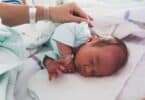A groundbreaking study has analyzed over 2,000 stool samples from babies in the UK to uncover which bacteria colonize the newborn gut in the earliest stages of life. This research, published in *Nature Microbiology*, offers new insights into how a baby’s microbiome forms and could have significant implications for understanding infant health.
Three Distinct Bacterial Profiles Identified
Scientists from the Wellcome Sanger Institute, University College London, and the University of Birmingham discovered that baby stool samples fit into three distinct microbiological profiles, each dominated by different “pioneer bacteria.” One of these bacteria, *Bifidobacterium breve* (B. breve), appears to support the baby’s ability to make the most of breast milk nutrients and help fight off infections, according to initial findings.
However, the study also found that another bacterium, *Enterococcus faecalis* (E. faecalis), could increase the risk of infection in newborns. While *B. breve* and *Bifidobacterium longum* bacteria were classified as beneficial, the presence of *E. faecalis* raised concerns.
Breastfeeding vs. Formula: Does It Impact Gut Bacteria?
The study, which included 1,288 healthy infants born in UK hospitals, also explored whether breastfeeding or formula feeding affected the types of bacteria present in a newborn’s gut. Surprisingly, the researchers found that the mode of feeding—whether breast milk or formula—did not significantly influence the dominant bacteria in the gut. Most of the infants in the study were either fully or partially breastfed during the first few weeks.
The study did, however, note that babies whose mothers received antibiotics during labor were more likely to have *E. faecalis* in their gut. Although the long-term effects of this are unclear, it suggests that antibiotics given during childbirth may influence a baby’s early microbiome.
Gut Microbiome and Long-Term Health
There’s growing evidence that a person’s microbiome—the diverse community of microbes living in the gut—plays a crucial role in overall health. While much research has focused on the adult microbiome, fewer studies have looked at how a baby’s microbiome develops during the first few days of life.
According to Dr. Yan Shao from the Wellcome Sanger Institute, “By analyzing the high-resolution genomic information from over 1,200 babies, we have identified three pioneer bacteria that drive the development of the gut microbiota.” Understanding how these bacteria contribute to gut health is a critical first step in developing personalized therapies that could support a healthy microbiome.
Personal Factors Play a Role
The research also highlights that factors such as the mother’s age, ethnicity, and whether she had given birth before may influence a newborn’s gut bacteria. As scientists continue to explore these connections, more work is needed to determine how different bacterial profiles impact long-term health outcomes for children.
While the study opens new doors for understanding gut microbiome development, experts agree that more research is needed. Dr. Ruairi Robertson, a microbiome science lecturer at Queen Mary University of London, explained, “This study significantly expands our knowledge about how the gut microbiome assembles in the first month of life. However, this has not yet translated into effective microbiome-targeted therapies.”
The Future of Infant Gut Health
Researchers hope this study will pave the way for personalized therapies that can help babies build healthy microbiomes from birth. As Prof. Louise Kenny from the University of Liverpool notes, decisions around childbirth and infant feeding are deeply personal and complex. Understanding how different birth methods and feeding practices shape a baby’s microbiome could lead to more informed choices for parents.
As part of the ongoing UK Baby Biome study, this research continues to deepen our understanding of how the early microbiome influences health—both in infancy and beyond.
Related Articles:







